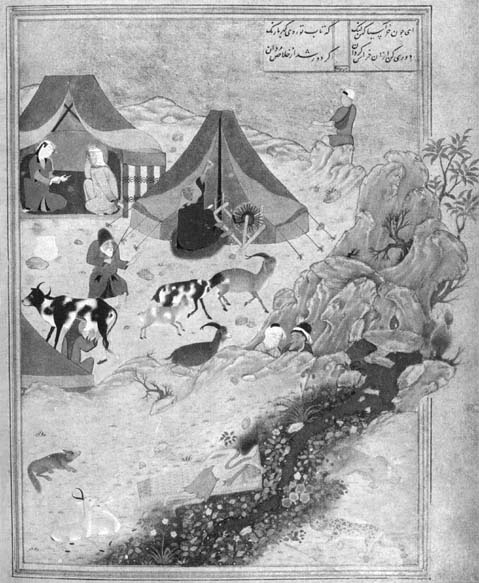 I woke up early this morning, like work-day early, and i figured I’d get some listening time in. I’m still working on the last 20% or so of American Gods. Well, I guess I wasn’t really ready to be awake, because I fell back into dreamland while listening. In my dream, I was at my father’s place in Florida, with the family on a visit, I suppose. In the dream I was listening to the same audiobook, and I guess he was trying to get my attention, so I pressed stop on the player, but the words kept coming. Strange. So I pulled the earbuds out of my ears (in the dream) and the WORDS KEPT COMING. There I was, confused as to why these words kept coming from inside my ears with no player and no earbuds. After a few more dream moments of this confusion, I woke up, laughed, removed the earbuds again and was actually relieved when the words stopped in real life that time. One of those recursive dreams would have really thrown me for a loop.
I woke up early this morning, like work-day early, and i figured I’d get some listening time in. I’m still working on the last 20% or so of American Gods. Well, I guess I wasn’t really ready to be awake, because I fell back into dreamland while listening. In my dream, I was at my father’s place in Florida, with the family on a visit, I suppose. In the dream I was listening to the same audiobook, and I guess he was trying to get my attention, so I pressed stop on the player, but the words kept coming. Strange. So I pulled the earbuds out of my ears (in the dream) and the WORDS KEPT COMING. There I was, confused as to why these words kept coming from inside my ears with no player and no earbuds. After a few more dream moments of this confusion, I woke up, laughed, removed the earbuds again and was actually relieved when the words stopped in real life that time. One of those recursive dreams would have really thrown me for a loop.
Category Archives: General Musings
Pizza Dare
 I think the fairly recent trend of “Pizza Dare” videos, in which women order pizza and then answer the door naked, sometimes alone, sometimes in pairs, is a scam.
I think the fairly recent trend of “Pizza Dare” videos, in which women order pizza and then answer the door naked, sometimes alone, sometimes in pairs, is a scam.
I think it’s a full-scale, all-out scam, orchestrated by the pizza delivery industry, in order to convince men, most of whom do not feel they get to see their share of naked women, to take the job at whatever low hourly wages are offered, hell, even for free, on the off chance that they’ll get to experience a live naked girl answering the door.
Also, there’s a double standard at play here. If *I* do it, I’ll have to register as a sex offender. Women almost NEVER get arrested for indecent exposure. Go figure.
Recurring Dream: Airships taking planes out of the sky
Have you ever experienced a recurring dream that morphs over time into a different outcome? I woke this morning from one of my recurring dreams.
In the past, I would hear a loud engine noise from the sky and see either an unfamiliar aircraft flying in patterns unsupported by known, existing craft, only to lose control and then crash, leading me to awaken with a sense of despair which can be related to witnessing a disaster.
Sometimes, rather than crashing itself, the strange craft would take out a traditional aircraft appropriate to our place an dtime. Again, despair and disaster.
This time, however, apparently the unidentified craft has improved technology. The first thing I heard was the sound. It was not unlike multiple transport helicopters flying low overhead — a heavy drone with deep undertones. I looked up, and soon realized it was an unidentifiable craft which first appeared to be in some large rectangular shape. In my dream, I went and got a camera and began photographing from my patio window.
It made several passes, starting out quite distant from my vantage point, and then making closer passes. I was able to get multiple photos. At one point the craft seemed to have “captured” a plane. Another pass, it seemed to be carrying a blimp.
In my dream, I didn’t get around to taking a closer look at the photos I had captured in order to draw them from memory. I had to put the camera down to deal with things that were going on in the house, and then I woke. Instead of a sense of despair, I woke with a sense of apprehension, as in the dream, I had realized that They, whoever They were, likely knew I had photos, and might have a problem with that.
The soundtrack throughout the dream was Radiohead, culminating in Subterranean Homesick Alien. Appropriately spooky?
The very last scene prior to waking, probably unrelated, was looking out my window to see folks sunning themselves by a riverside. In January.

That one time at Christian camp…
Yeah, I went to Christian camp once. It was Young Life camp, at Windy Gap, North Carolina. I don’t remember everything about it, other than it was camp, things went on there that normally went on at camp — activities like canoeing, crafts, pranking other campers, especially the ones in the other cabins, etc.
I don’t remember the religious aspect of the camp being overbearing, but it was fun and somewhat seductive. The songs were infectious. Over thirty years later and I still remember the songs, good Lord it’s been a long time.

I remember, vaguely, that I was maybe a year too young to be there officially, but someone pulled some strings. A lot of strings were pulled for me as a kid. I was a quirky kid. I didn’t understand it much then, but now that I have quirky kids, I kind of do. At least a little better. And I’m not much better equipped to help them than I was back then to help myself.
Do you ever reminisce long past days, and remember small things, tiny things, rather than the big events? Sometimes I’ll look back at times like this and remember little but a turn of phrase that someone uttered. And the songs. And the fact that that’s where I learned to saran wrap a toilet.
City Steam Grates, Cellar Doors and other Perilous Entryways
In my younger and more open-minded days, I spent a lot of time in the city. Even when I didn’t live in the city proper, I was a city-dweller. In the city, you see grates and doors in the sidewalk all the time. Sometimes they are steam grates, sometimes cellar doors for store stockrooms, sometimes above Metro, sometimes above drainage systems.
I used to imagine they were a test, and only the pure of heart could walk across them without falling through. And knowing my purity levels tended to waver, I would sometimes actually get a bit nervous in anticipation of walking across them.
Note: not the same kind of purity test as this — if it was that type of test, I would have only had a 30% chance of making it across.
Last week outside the Black Cat, I saw some of those cellar doors, and flashed back to those days of old. Before the show, I didn’t take a chance on walking across them. After the show, I figured, “what the hell,” and walked across. Successfully.
Meanwhile, in Brooklyn:
Brooklyn Man Dies After Falling Through Sidewalk Cellar Grate
Zen magnet fun
Hacking the Progressive Snapshot OBD-II Device
I hate that this device exists, and that a company can use such intrusive measures to gauge your worthiness as a driver, and charge you based on arbitrary criteria such as whether you brake too fast. Numbers and data from a monitoring device do not tell the whole story. Maybe your fast braking saved a child, or a kitten.
Plus they have access to other information – basically anything your OBD port can tell them. GPS data is an obvious target. With modern vehicles becoming more and more integrated, what else?
Anyhow, I love that people have already figured out how to work around it and limit the amount of information provided to Progressive.
I don’t use Progressive, but if I did, and they asked me to use this device, I would certainly consider this hack. Thanks to the person in my feed who mentioned this and brought it to my attention.
Hacking the Progressive Snapshot OBDII device for perpetual 30% discount on insurance
by inhacking
NO!
Fragile Things
 I’m having a wonderful time absorbing (via audiobook) Neil Gaiman’s short story collection, Fragile Thing: Short Stories and Wonders. I’ve come to it awkwardly — I am ashamed to admit that it is my first exposure to Gaiman, despite his being on my to-do list for a number of years now — and I suspect it’s not the path most people take. But it was convenient, and here I am.
I’m having a wonderful time absorbing (via audiobook) Neil Gaiman’s short story collection, Fragile Thing: Short Stories and Wonders. I’ve come to it awkwardly — I am ashamed to admit that it is my first exposure to Gaiman, despite his being on my to-do list for a number of years now — and I suspect it’s not the path most people take. But it was convenient, and here I am.
He has clearly mastered the clever, the horror, the inventive plot twist, and the devil in the details, but he also has the skill of embedding realities between the lines that may be unprintable, unspeakable, even undefinable, in such a way that the reader will receive the transmitted message just the same. I have other Gaiman works on deck. If you have a favorite you’d like to recommend, or one that you know would particularly appeal to me, for whatever reason, please feel free to share.
Layla and Majnun
(another source references this old, old story as the source for Clapton’s inspiration for the song Layla)
Follow Your Heart: The Story of Layla and Majnun
By J. T. Coker
Layla and Majnun have been characters for Sufi poets, as Krishna was for the poets of India. Majnun means absorption into a thought and Layla means the night of obscurity. The story is from beginning to end a teaching on the path of devotion, the experience of the soul in search of God. — Pir-o-Murshid Inayat Khan
The story of Layla and Majnun is one of the most popular in the Islamic world, enduring in legends, tales, poems, songs, and epics from the Caucasus to Africa and from the Atlantic to the Indian Ocean. Scholars find good reasons to believe that the central character — Qays, nicknamed Majnun (Madman) — lived in northern Arabia in the second half of the seventh century, five hundred years before the poet Nizami. At the behest of the Transcaucasian chieftain Shervanshah, Nizami collected many of the widely dispersed traditional versions and wove them into his great narrative poem.
No one knows the number of translations of Nizami’s work in the many languages encompassed by Islamic religious culture, but at least forty Persian and thirteen Turkish versions are known, and one scholar states that there are actually over a hundred versions in those two languages alone. An English translation appeared in 1836 which relied on an incomplete text with later additions by lesser poets (this text was used by Eric Clapton in the late 1970s for certain lyrics on his recording Layla and Other Love Songs). The translation by Dr. Rudolf Gelpke [The Story of Layla and Majnun by Nizami, trans. and ed. by Dr. Rudolf Gelpke, English version in collaboration with E. Mattin and G. Hill, Omega Publications, New Lebanon, NY, 1997; all page references are to this edition] published originally in 1966, offers insights into medieval Arabic culture and mores. Though cast in prose, poetry lovers will catch fulfilling glimpses of Nizami’s poetic and mystic genius. Moreover, the Omega edition includes the work’s final chapter, translated by Zia Inayat Khan and Omid Safi.
The story begins with the Sayyid, a man of wealth, power, and prestige, desiring a son and heir. He importunes Allah, who grants his request. The beauty of his son Qays “grew to perfection. As a ray of light penetrates the water, so the jewel of love shone through the veil of his body.” At the age of ten, Qays goes to school and meets his kismet/fate, Layla. “Does not ‘Layl’ mean ‘night’ in Arabic? And dark as the night was the color of her hair.” Love struck them both; others noticed, tongues wagged, and Qays first tastes bitterness. He refrains from seeing her, but his heart breaks and he begins to slip into melancholy. Layla’s tribe, to protect her (and their) honor, deny her right to see him, and he falls into madness: “A madman he became — but at the same time a poet, the harp of his love and of his pain.”
In time Majnun runs away into the wilderness, becoming unkempt, not knowing good from evil. His father takes him on pilgrimage to Mecca, to seek God’s help in freeing him, but Majnun strikes the Kaaba and cries “none of my days shall ever be free of this pain. Let me love, oh my God, love for love’s sake, and make my love a hundred times as great as it was and is!” He continues to wander “like a drunken lion,” chanting poems of Layla’s beauty and his love. Many come to hear him. Some write down the poems he spontaneously speaks.
Meanwhile, Layla holds their love quietly so none will know
she lived between the water of her tears and the fire of her love, . . .
Yet her lover’s voice reached her. Was he not a poet? No tent curtain was woven so closely as to keep out his poems. Every child from the bazaar was singing his verses; every passer-by was humming one of his love-songs, bringing Layla a message from her beloved, . . . — p. 40
Refusing suitors, she writes answers to his poems and casts them to the wind.
It happened often that someone found one of these little papers, and guessed the hidden meaning, realizing for whom they were intended. Sometimes he would go to Majnun hoping to hear, as a reward, some of the poems which had become so popular. . . .
Thus many a melody passed to and fro between the two nightingales, drunk with their passion. — p. 41
Eventually Layla is married to another, but refuses conjugality. Being in love, her husband accepts her condition of an outward marriage only. Majnun learns of the marriage and of her faithfulness. Neither his father nor his mother, when near death, can induce him to return to his people. Wild animals, loving rather than fearing him, congregate in his presence, protecting him. One night Majnun prays to Allah, thanking Him for making him the pure soul he now is and asking God’s grace. He sleeps, and in his dream a miraculous tree springs from the desert, from which a bird drops a magic jewel onto his head, like a diadem.
An old man, Zayd, helps Layla and Majnun to exchange letters and finally to meet, though she cannot approach him closer than ten paces. Majnun spontaneously recites love poetry to her, and at dawn they go their separate ways. Nizami asks:
For how long then do you want to deceive yourself? For how long will you refuse to see yourself as you are and as you will be? Each grain of sand takes its own length and breadth as the measure of the world; yet, beside a mountain range it is as nothing. You yourself are the grain of sand; you are your own prisoner. Break your cage, break free from yourself, free from humanity; learn that what you thought was real is not so in reality. Follow Nizami: burn but your own treasure, like a candle — then the world, your sovereign, will become your slave. — p. 148
After the death of Layla’s husband, she openly mourns her love for Majnun, and dies shortly thereafter. Majnun hears of her death and, mad with grief, repeatedly visits her tomb. He dies and is buried beside his beloved.
“Majnun Dies on Layla’s Tomb,” Bihzad (c. 1495)
In a dream, Zayd, who tends their joint grave, has a vision of them in paradise, where an ancient soul tells him:
These two friends are one, eternal companions. He is Majnun, the king of the world in right action. And she is Layla, the moon among idols in compassion. In the world, like unpierced rubies they treasured their fidelity affectionately, but found no rest and could not attain their heart’s desire. Here they suffer grief no more. So it will be until eternity. Whoever endures suffering and forebears in that world will be joyous and exalted in this world. — p. 176
On waking Zayd realized that
Whoever would find a place in that world must tread on the lusts of this world. This world is dust and is perishable. That world is pure and eternal. . . . Commit yourself to love’s sanctuary and at once find freedom from your ego. Fly in love as an arrow towards its target. Love loosens the knots of being, love is liberation from the vortex of egotism. In love, every cup of sorrow which bites into the soul gives it new life. Many a draft bitter as poison has become in love delicious. . . . However agonizing the experience, if it is for love it is well. — pp. 176-7
So ends Nizami’s poetic narrative of the story of Layla and Majnun, but to really appreciate and understand this work, it needs to be read, and savored, in full. Is their story a medieval soap opera of epic proportions? It is, if that’s what your heart hears. Is it a cautionary tale inculcating acceptance of earthly injustice and suffering in the Islamic faithful, who will be rewarded in the great by-and-by? It will surely serve, if that’s your concern. Is Majnun “Man” and Layla “Soul,” suffering because denied union while bounded by flesh? Yes, if your concern, your love, leads you to hear it that way. Is it an allegorical Sufi text, instructing seekers in practical means for awakening to the supernal reality of their true, spiritual nature? Only our hearts know for sure — Nizami bids us follow them.




